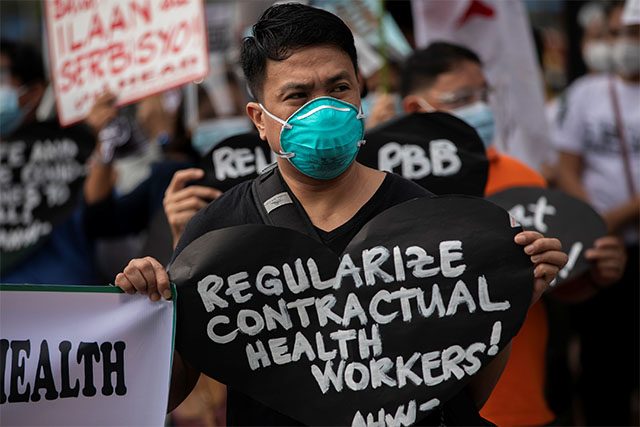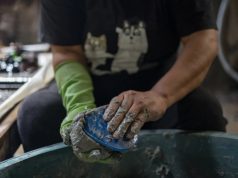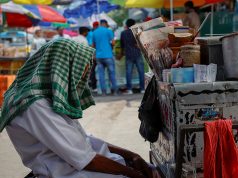
Critics accused the labor bureau of modern slavery and exploitation following its request to trade health care workers with the needed COVID-19 vaccines.
Alice Visperas, director of the labor ministry’s international affairs bureau, said that Labor Secretary Silvestre Bello III asked the United Kingdom and Germany to donate much-needed vaccines and in turn, allow Filipino medical professionals to work there.
The vaccines, Visperas noted in a recent briefing, will be used for overseas Filipino workers who were previously displaced due to the coronavirus pandemic.
“Secretary Bello’s request is for our OFWs, these are the OFWs that were repatriated, who are here in the country including those who will be deployed. It is important, especially those who are set to leave since many countries who are hiring migrant workers want workers that have been vaccinated,” she said.
The senior official said that more than 600,000 OFWs will benefit from this deal.
In a Reuters report, she was quoted as saying that this is already “subject to agreement.”
READ: Philippines offers nurses in exchange for vaccines from Britain, Germany
The national government previously imposed a deployment cap on all health workers last year to ensure that there are enough nurses and doctors to handle the infected patients.
Accusations online
Social media users, especially members of the medical community, criticized the DOLE for allegedly treating Filipinos as “commodities” and “goods” for trade.
“Where did all the billions of dollars of loans go? Why are we acting like gangsters and extortionists? This government is now trading off our healthcare workers for goods. That’s effin slavery right there!” one user said.
“Our frontliners are not commodities for trade!! sobrang baba na nga ng pasahod sa kanila at halos wala silang makuhang hazard pay. ano ‘to?” another said.
They perceived this practice as a form of “human trafficking” or “barter trade.”
“Human trafficking is a far more polite term than pimping nurses, DOLE, for vaccines,” a Twitter user also said.
“Philippines would exchange our skilled nurses, OUR PEOPLE in exchange for vaccines when our government BORROWEED A LOT to solve this Covid problem. Smells like human trafficking and corruption to me,” tweeted another.
God its like state-sponsored human trafficking.
Philippines offers to let nurses work in Britain and Germany in exchange for coronavirus vaccines – CNNhttps://t.co/e3mJfasqYk
— Maoi Arroyo (@MaoiArroyo) February 24, 2021
Former senatorial candidate Erin Tanada echoed these views and asked: “Human Trafficking… Barter Trade… is this the way we look at our health care workers or workers in general?”
“Or is the bigger story the FAILURE of the government to procure the right number of vaccines for our country so they had to resort to embarrassing measures…” he said.
Twitter user @RonanInManila also pointed out that OFWs are the ones who decide to go abroad and are not forced to be deployed by the government.
“Very disturbing. OFWs aren’t sent abroad by the government. It’s an addition of individual decisions. If government has any responsibility in that, it’s their failure at keeping them in the country. And now you’re bartering them for vaccines?” he said.
Philip Jamilla, public information officer for Karapatan, cited a Filipino theorist-scholar Neferti Tadiar‘ definition of “new-industrial slavery.”
“This dehumanizing policy of exporting our own labor as barter—which Neferti Tadiar refers to as ‘new-industrial slavery’—has long been ‘a component part of the conditions of globalization,’ but it is more glaring now that we are bartering our own healthcare workers for vaccines,” Jamilla wrote.
Forced labor or modern-day slavery?
The terms “forced labor” and “modern-day slavery” are intertwined with one another, according to the International Labor Organization.
“It refers to situations in which persons are coerced to work through the use of violence or intimidation, or by more subtle means such as manipulated debt, retention of identity papers or threats of denunciation to immigration authorities,” said ILO.
Practices include human trafficking, better known as modern slavery or slave-like practices in recent decades.
In the Philippines, scholar Tadiar called it “new industrial-slavery” in her book titled “Fantasy Production: Sexual Economies and Other Philippine Consequences for the New World Order.”
A digital copy of this can be viewed via Google Books.
Tadiar explained that she used the adjective “new-industrial” because this practice or acts of slavery came from the “expansion and development of late capitalism.”
“One the one hand, new-industrial slavery is the consequence of the unremitting expansion of capital and its need to combat the falling rate of profit through the conversion of humans into disposable, surplus people,” Tadiar wrote.
“On the other hand, new-industrial slavery naturalizes the social imaginary within which the international labor market is a necessary reality by symbolically serving as the very negation of the fair and rational system of capitalist accumulation,” she added.
RELATED: ‘Not new’: Similar nurse ‘trade-off’ with Japan during Arroyo time recalled









